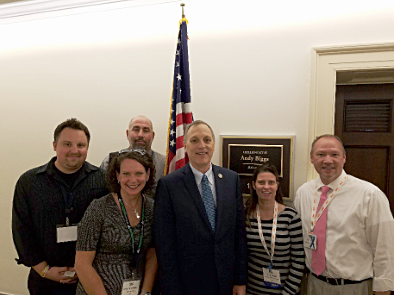Now Is the Time to Advocate
/By Barby Ingle, PNN Columnist
I have written many articles on patient advocacy and it is still one of the topics I am most asked about. Now through the first week of September is the perfect time to visit with your state legislators and congressional representatives. I have appointments with three coming up in the next few weeks myself.
They need to hear from their constituents. The need to learn about issues facing people who vote in their districts and state. They need to know who makes up the pain community so that they can better represent and REMEMBER us when it is time to vote on legislation that may help or hurt our access to proper and timely pain care.
How do you get an appointment? Look up the website for your legislator or congressman and request a meeting. Sometimes you can make an appointment directly through the website, but I believe the best way is to call and set it up, followed by a written request or confirmation of the appointment.
You may be scheduled with the lawmaker themselves or a staff member who assists them with a particular issue. In our case, it is usually the staffer who handles health or insurance issues.
These appointments can take place in Washington, DC or in your home state. The U.S. House (but not the Senate) is in recess until after Labor Day, so most representatives are in their districts campaigning for the midterm elections. Many are taking meetings and doing town halls.
When you call for a meeting, you may get voicemail. Leave a message! If you don’t get a return call in a few days, call again. If someone answers, call and ask to speak with the scheduler.
It’s impressive to friends, family and other pain community members when you actually follow through with a meeting. It is something that anyone can do, but few actually try. Most rely on others to make it to these meetings.
You need to focus on what you'll talk about before the meeting. If you get an appointment, dig in and study. Do your homework and research legislation so you can explain why you support or oppose it. Share your personal story in a highlight reel fashion. You might have a 20+ year story of living with chronic pain and illness, but you should get it down to no more than 2 minutes. Highlight the challenges you faced and where you are now in the chronic care process.
Make an Ask
The main purpose of your first meeting will be to familiarize yourself with your senator, representative or legislator and make a memorable connection. Stay on topic, stay timely and “make an ask” – ask them to do something specific for you.
These meetings typically last 15 to 20 minutes. Don’t bring a truck load of supporting materials. Discuss no more than 3 topics at the meeting and leave a one-page fact sheet for each topic. You want them to know that they can use you as a resource, so include a calling card with your contact information.
If you are asked about a fact that you don’t know the answer to, just say, “I don’t know.” It is better to be truthful than to make something up and risk losing credibility. You can always follow-up later with the information they seek.
You are there to make an ask, so set a reasonable deadline for them to respond to you with the answer. They may say right away they won’t support or oppose a bill and why. Don’t argue with them if they do. Use it as a teachable moment as to why you hope they will reconsider and how their decision will affect you and others like you in the pain community. If they haven’t taken a position on the issue in the past, it is not likely that they will commit to one in this meeting.
When you get home, always send a short thank you letter to the representative or staffer who was there. Also include any follow-up answers you promised. Remember, if you met with a staffer, they are there to filter out the messaging and bring back the best info they can to the representative.
our 2017 MEETING WITH WITH REP. ANDY BIGGS
If you do get an actual face-to-face chat with your senator or representative, you are lucky. In 2017, we were fortunate to get a meeting with Arizona Rep. Andy Biggs (pictured above). A personal meeting like that demonstrates to lawmakers there is a constituency for chronic pain and illness that is active in their district and needs to be listened to.
After your first meeting, get ready for the next one. Stay in touch with the staffers and representatives, and when it comes time for them to act or vote, there is a better chance they will remember you and your story and do something that helps the pain community in a positive way.
Hearing directly from patients and caregivers goes a long way in helping us get access to proper and timely pain care. They need to know that we care, so they should care too.
Barby Ingle lives with reflex sympathetic dystrophy (RSD), migralepsy and endometriosis. Barby is a chronic pain educator, patient advocate, and president of the International Pain Foundation. She is also a motivational speaker and best-selling author on pain topics. More information about Barby can be found at her website.
The information in this column should not be considered as professional medical advice, diagnosis or treatment. It is for informational purposes only and represents the author’s opinions alone. It does not inherently express or reflect the views, opinions and/or positions of Pain News Network.






